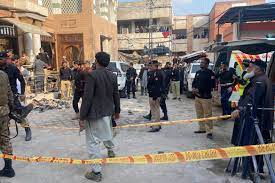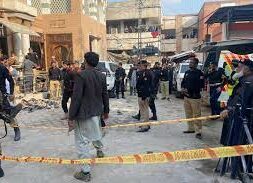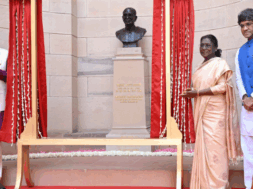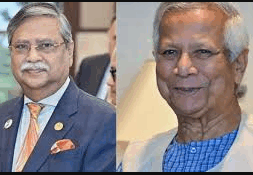
46 Killed, over 150 Injured in Terror Attack in Pakistan
Manas Dasgupta
NEW DELHI, Jan 30: At least 46 people, mostly policemen, were killed and over 150 others injured when a Taliban suicide bomber blew himself up in a mosque packed with worshippers during afternoon prayers on Monday in the high-security zone in Pakistan’s north-western Peshawar city close to former tribal areas that border Afghanistan where militancy has been steadily rising, security and health officials said.
The blast occurred inside the mosque in a highly sensitive Pakistani police headquarters prompting the government to put the country on high alert. It happened around 1.40 pm when worshippers, which included personnel of the police, army and bomb disposal squad – were offering the Zuhr (afternoon) prayers. The bomber who was present in the front row blew himself up, officials said.
Lady Reading Hospital officials said 46 people have died so far. However, the Peshawar Police has released a list of 38 victims. A frantic rescue mission was underway at the mosque, which had an entire wall and some of its roof blown out by the force of the blast.
“Many policemen are buried under the rubble,” said Peshawar police chief Muhammad Ijaz Khan, who estimated between 300 and 400 officers usually attended prayers at the mosque. “Efforts are being made to get them out safely,” he said.
Bloodied survivors emerged limping from the wreckage, while bodies were ferried away in ambulances as the rescue operation continued. “It’s an emergency situation,” Muhammad Asim Khan, a spokesman for the main hospital in Peshawar said. Khyber Pakhtunkhwa governor Ghulam Ali put the death toll at 28 and 150 wounded, most of them policemen.
The police headquarters in Peshawar is in one of the most tightly controlled areas of the city, housing intelligence and counter-terrorism bureaus, and is next door to the regional secretariat. The country was put on high alert after the blast, with checkpoints ramped up and extra security forces deployed, while in the capital Islamabad snipers were deployed on buildings and at city entrance points.
“Terrorists want to create fear by targeting those who perform the duty of defending Pakistan,” said Prime Minister Shehbaz Sharif in a statement. “Those fighting against Pakistan will be wiped out from the face of earth. The entire nation is standing united against the menace of terrorism.” He also said a comprehensive strategy would be adopted to counter the deteriorating law and order situation in restive Khyber Pakhtunkhwa and the federal government would help the provinces in increasing their anti-terrorism capacity.
Foreign Minister Bilawal Bhutto Zardari also condemned the attack, saying “terrorist incidents before the local and general elections were meaningful.” Officers said the blast came from the second row of worshippers, with bomb disposal teams probing the possibility of a suicide attack.
A brother of the slain commander of the Tehreek-e-Taliban Pakistan (TTP) Umar Khalid Khurasani claimed that the suicide attack was part of the revenge attack for his brother who was killed last August in Afghanistan. The outlawed TTP, known as the Pakistani Taliban, has carried out a number of suicide attacks in the past, targeting security personnel.
Shahid Ali, a policeman who survived, said the explosion took place seconds after the imam started prayers. “I saw black smoke rising to the sky. I ran out to save my life,” the 47-year-old said. “The screams of the people are still echoing in my mind,” he added. “People were screaming for help.”
Superintendent of Police (Investigation), Peshawar, Shazad Kaukab, whose office is close to the mosque, told the media that the blast occurred when he just entered the mosque to offer prayers. He said he luckily survived the attack. A police official said a portion of the mosque collapsed and several people were believed to be under it.
The bomber entered the highly secured mosque inside police lines where four layers of security were in place to enter the mosque. The drastic security breach came on the day United Arab Emirates (UAE) President Mohamed bin Zayed Al Nahyan had been due to visit Islamabad, although the trip was cancelled at the last minute due to bad weather. Pakistan is also preparing to host an International Monetary Fund (IMF) delegation on Tuesday as it works towards unlocking a vital bailout loan to prevent a looming default.
Security has been beefed up in other major cities, including Islamabad, after the Peshawar blast. In Islamabad, security at all entry and exit points of the capital city has been increased and snipers have been deployed at “important points and buildings.”
The security situation in Pakistan — once plagued by bombings until a major military crackdown that began in 2014 largely restored order — has deteriorated since the return of the Afghan Taliban in Kabul. Islamabad has accused the new rulers of failing to secure their mountainous border, allowing militants to travel back and forth without being detected.
The biggest threat comes from a resurgent Pakistani Taliban, a separate movement from the Afghan Taliban but with a similar ideology, which has sharply increased low casualty attacks on police and security forces. The TTP, set up as an umbrella group of several militant outfits in 2007, called off a ceasefire with the federal government and ordered its militants to stage terrorist attacks across the country.
The group, which is believed to be close to al-Qaeda, has been blamed for several deadly attacks across Pakistan, including an attack on army headquarters in 2009, assaults on military bases, and the 2008 bombing of the Marriott Hotel in Islamabad.
In 2014, the Pakistani Taliban stormed the Army Public School (APS) in the north-western city of Peshawar, killing at least 150 people, including 131 students. The attack sent shockwaves across the world and was widely condemned.
Meanwhile, the regional chapter of the Islamic State — whose numbers were bolstered by prison breaks in Afghanistan in 2021 — claimed an attack on a minority Shiite mosque in Peshawar that killed 64 last year, Pakistan’s deadliest terror attack since 2018. Detectives said the bomber was an Afghan exile who had returned home to train for the attack.












